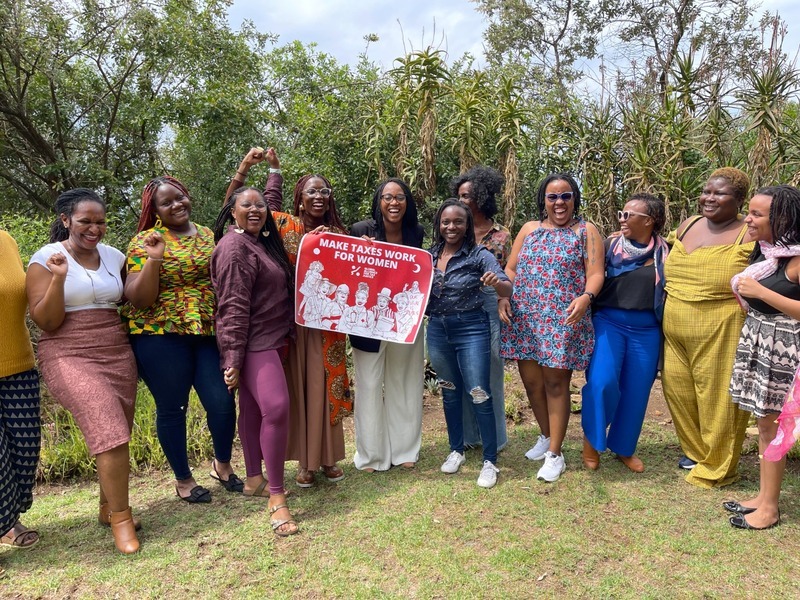Date

Recognizing the need for a well-defined political ideology to ground African feminist efforts towards tax justice advocacy, the Tax Justice Network Africa and Nawi Afrifem Macroeconomics Collective convened African feminists working on the political economy, tax experts, researchers, artists, and writers from a cross-section of the continent’s regions for the Pan African Feminist Visioning Retreat on Tax Justice from 12th-14th June in Naivasha, Kenya. This collective strategizing retreat sought to collate the political demands of the collective and strengthen the movement on tax justice from an African perspective.
“The ways in which recognition and redistribution happen are shaped by political ideology. To articulate demands for tax justice, therefore, our work must be rooted in political theories that foreground gender, class, race, citizenship, and other identities that intersect to further marginalize” read the visioning document for the retreat. Bringing this discussion to the fore, the participants decried the current taxation framework as an affront to basic rights and a system that serves a few capitalist entities in the Global North/former colonizers at the expense of the laboring masses in the Global Majority including Africa. They positioned neoliberal capitalism as a system concerned only with accumulation at any cost that creates and artificial scarcity of resources.
A system of our own
For colonial administrations, the acceptance of tax was the barometer of a local people’s surrender to colonial rule. Currently, global tax policy remains steeped in this legacy of colonization where former colonizers persist in dictating punitive taxation terms to formerly colonized countries, many of which are in Africa.
Omolara Oriye from Liberation Alliance Africa questioned, “Is it possible to imagine change through the lens of colonial legacies of taxation?” Echoing these sentiments, participants emphasized the importance of a radical African feminist dreaming towards alternative, decolonial frameworks that do not seek to dominate but rather to respond to the needs and material realities of African people and particularly women and gender expansive persons, who are made invisible by current neoliberal taxation systems.
Later, the principles of taxation (4Rs of taxation) would come under scrutiny following a presentation by TJNA’s Acting Executive Director, Chenai Mukumba that prompted a discussion into their relevance in the African context and the need for an expansion of the function of taxes to include their reparative potential in recognizing historical harms done to formerly colonized nations. Drawing examples from similar efforts in the Caribbean context, the participants agreed that tax justice should incorporate reparations for past harms and unconditional debt cancellation for economies crippled by debt repayments to International Financial Institutions and forced austerity measures.
An African feminist response to taxation
Virtually presenting a framing paper on Tax and African Feminist Political Economy during the retreat, Prof. Lyn Ossome, Director of the Makerere Institute of Social Research encouraged feminist approaches on tax justice to be rooted in the theories of social reproduction that bring to light women’s reproductive work offering, “Care economies are rendered invisible in tax policy”.
Prof. Ossome urged feminist economists to challenge orthodox economic models by highlighting the gendered nature of labour with a granular focus on the microeconomies that feed and sustain the macro-economies, emphasizing that the micro presents a site for specific gendered data with which to engage tax administrators and policy makers.
Suspending disbelief to radically dream
Articulating which values would underpin a feminist approach to tax justice, the collective proposed values such as mutual sharing, egalitarianism, mutual accountability and justice. These values echoed within the pages of ‘In a time not so far away’, a poetic imagining of an African feminist economy that served as inspiration for the radical dreaming and whose author, Agazit Abate was in attendance. Stemming from these values would be concrete strategies to engage tax administrations and global tax policy makers towards shifting from current systems that breed inequality, to those that secure the fundamental rights for the laboring masses.
The theme of abundance, collective laboring, rest and collective building was resonant within the three-day retreat, perfectly captured through the words of Aurea Mouzinho from the Global Alliance for Tax Justice, “We should labour together, to build collectively.”
The strategies tabled at the convening focused on the importance of a coherent and cross-disciplinary approach to tax justice, embedding a feminist lens across different sectors of the macroeconomic conversation, bolstering advocacy demands with specific data when engaging tax administrations and raising feminist consciousness through research-driven toward unpacking and understanding the nuances of Global Tax Policy decision making.
Ultimately, the deliberations from the retreat, along with other inputs from feminists in tax justice, will culminate in an African Feminist Tax Charter, a guiding document for activists, much akin to the Charter of Feminist Principles for African Feminists to locate the push for tax justice as a liberatory and inherently political claim.
Capturing the spirit of time-worn struggle, Leah Eryenyu, convener of the visioning retreat, asserts that we are currently engaged in a war of imagination, and the prevailing victor in this battle is the neoliberal paradigm.